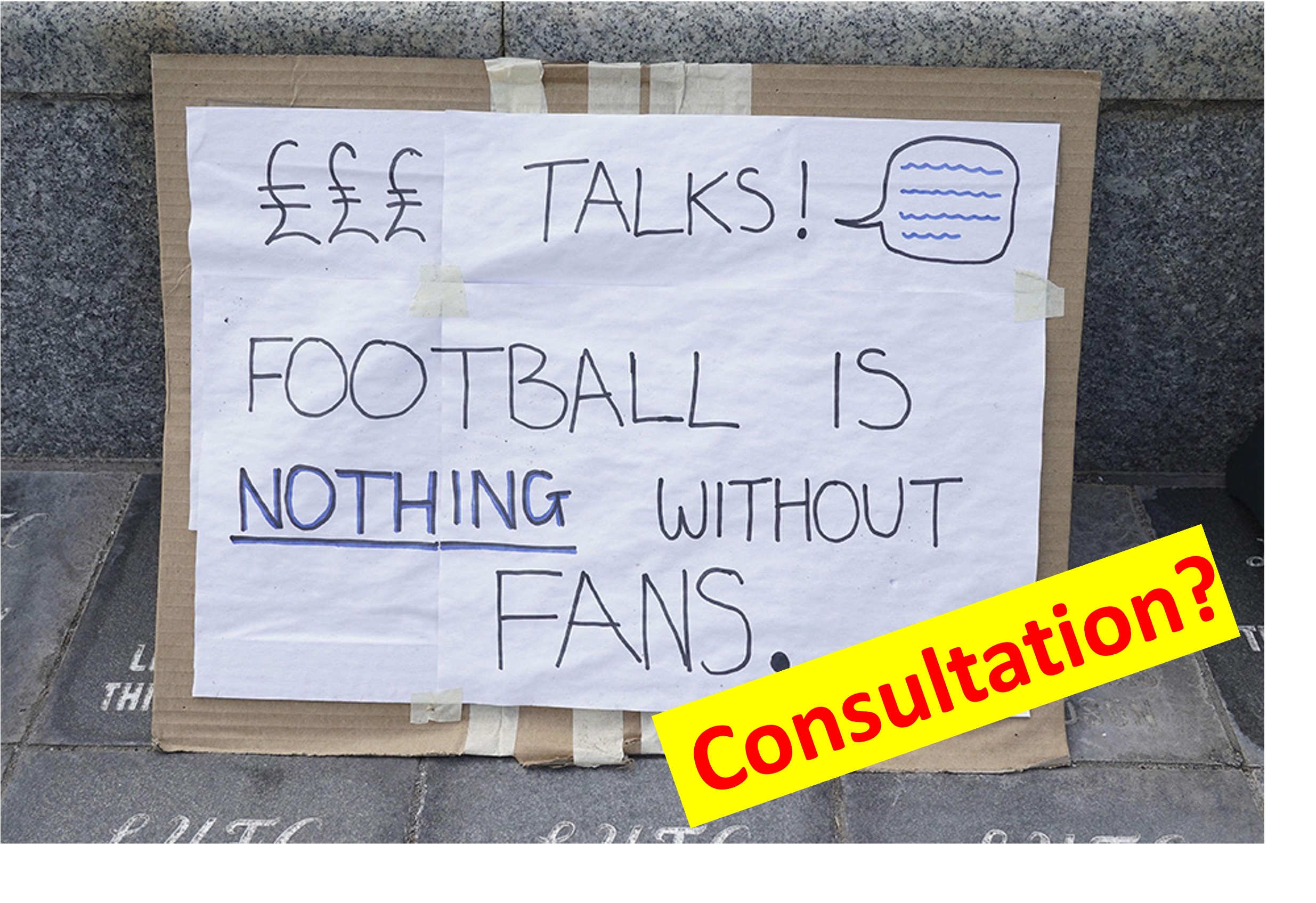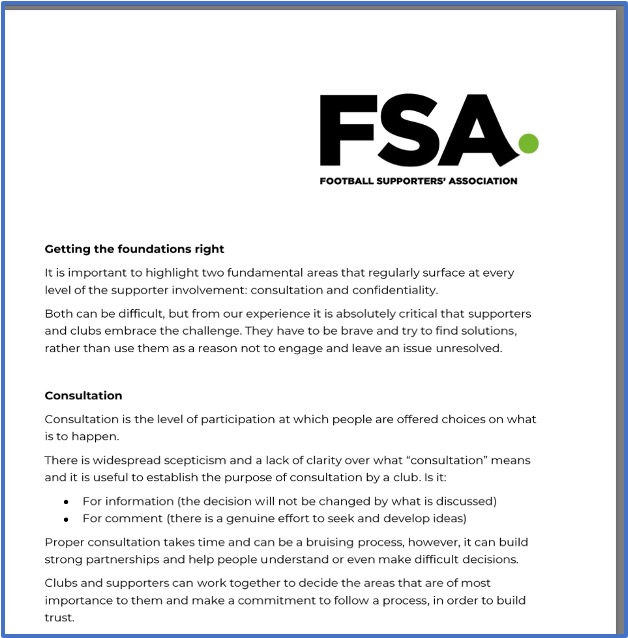This is Blog No 65
Ministers in Westminster have introduced a Parliamentary Bill which they hope will truly connect with the British People. Or at least the 10 million or so who at some stage or another regard themselves as football fans.
Picture from the 2021 Fan-led review of
football governance: securing the game’s future

Politically, the Football Governance Bill has it all. A subject that arouses passionate interest, a bias away from wealthy foreign owners and towards traditional British communities, a whiff of anti-European sentiment to prevent a super league, a gesture towards democratic accountability and all in the name of preserving our sporting heritage – given that we invented it anyway. Didn’t we?
It's been a while coming, and there will be Conservative MPs appropriately enough kicking themselves that they’ve left it so late before a General Election that it may only get the Royal assent after ‘extra time’ in a new Parliament and that a new Government will get the credit.
And there will be credit, for much of what is proposed will surely be warmly welcomed. They have got many things right. Just a shame therefore that they are in danger of getting one big thing wrong!
The trouble is all about terminology. One of the avowed goals (sorry!) of the legislation is to tackle the injustice that the beautiful game and the clubs that play it are irrevocably changed against the wishes of its many supporters. So, from early in the pre-legislative dialogue, there has been almost unanimous support for giving fans a greater say in what happens.
The original 2021 Fan-led review complained that ‘consultation’ was “often being limited solely to match going issues with no consideration of fan views on any strategic or commercial matters.” It was, said the Review often a ‘tick box’ approach to supporter engagement …, often leading to a significant gap between club and supporter perception of the provision of fan engagement.”
By the time the Department of Media, Culture & Sport published its Command Paper in February 2023, the solution proposed was expressed like this:
“Clubs will need to satisfy the Regulator that they have appropriate and
proportionate provisions for considering the interests of fans on key decisions
and issues of club heritage. Clubs will need to show they are regularly
consulting a representative group of fans on key strategic matters at the club,
and other issues of interest to supporters (including club heritage)” ( at p.55)
A formal consultation followed, and we now have the Bill. It creates an Independent Football Regulator with unprecedented powers that will affect who can and cannot own clubs, how they are run, and, how they engage with their own supporters. It does this through a complex licensing system, with everyone being subject to what are called ‘mandatory’ requirements, and additional requirements for those who are above a certain ‘threshold’. My expectation was that all clubs would be required to comply with a basic standard of fan engagement, and those above a threshold subject to a more demanding regime. That is because as is well known, ‘engagement’ is essentially about building and sustaining relationships, but is difficult to enforce. Consultation, on the other hand is a rule-based process and those rules can be enforced in the High Court.
But that is not quite how the Bill is worded. Under the mandatory requirements, every club will have to ‘consult’ regularly – in other words – the more demanding, precise, and enforceable standards. It is called Fan consultation. (Schedule 5 of the Bill) .Beyond the threshold, the language is Fan Engagement (Schedule 4 of the Bill) which contains more detail. Specifically, it not only mentions consulting the fans, but also taking their views into account – something which is inherent in the process of consultation anyway, but never mind. It then spells out the subjects upon which consultation is required. They include club objectives and priorities, match-day issues, stadiums, shirt colours and, of course the club’s name. Great, I thought, that’s the distinction between the two levels of required engagement.
But then I found out that the mandatory requirements also covered the same subjects!
So I then realised that the problem is that Ministers have not understood how public and stakeholder consultation actually works!
Looking at the immense amount of documentation on this subject, I found absolutely excellent work by the Football Supporters Association, whose materials on Supporter engagement I strongly recommend. However, in its paper on Getting the foundations right (see image), it states that there is widespread scepticism and a lack of clarity about what ‘consultation’ means’
It may be right about scepticism, but totally wrong about consultation. There is no lack of clarity.

As readers of this blog know well, the rules of consultation are well established, very clear and mostly observed by hundreds of civil servants, local government officers, NHS Managers, and others on a daily basis.
And as Elizabeth Gammell and I pointed out in The Politics of Consultation, the problem lies with the politicians who prefer to use language loosely and who find it convenient to talk vaguely about participation, involvement, engagement, and consultation as if they were wholly interchangeable. What’s happened here probably is that in the legitimate desire to respond to public anxiety about the cherished game, they have committed to consultation without maybe fully recognising the true rigour of what they are proposing.
Reading between the lines, I fear that too many have assumed that consultation is merely sitting down with ‘representative’ groups of supporters and having a dialogue.
Best practice and legally-defendable consultation goes well beyond this, and (per the Gunning principles) include the need to begin when issues are at a formative stage, to provide sufficient information as to allow intelligent consideration with sufficient time to do so. I have no doubt that football supporters will be delighted if clubs and their owners are to be obliged to consult properly in this way. But is this quite what Ministers intend? And is it what the football authorities and the clubs think they’ve signed up to?
Amid this confusion, there is hope that interested Members of Parliament will work together to tidy up this confusion, and maybe, in the process, avoid some of the unintended consequences that have often resulted from hurried and ill-considered drafting of consultation obligations over the years.
Otherwise, we may have to rely upon retired Judges in the House of Lords to come off the bench (sorry again) to straighten out the uncertainty and avoid bequeathing the Regulator an avoidable problem and the game an unwanted distraction.
Please note I’ve avoided any reference to VAR!
Rhion H Jones LL.B
The Consultation GuRU
See Rhion's Speeches etc - click here
For More like this - free of charge: now click here
Leave a Comment
I hope you enjoyed this post. If you would like to, please leave a comment below.